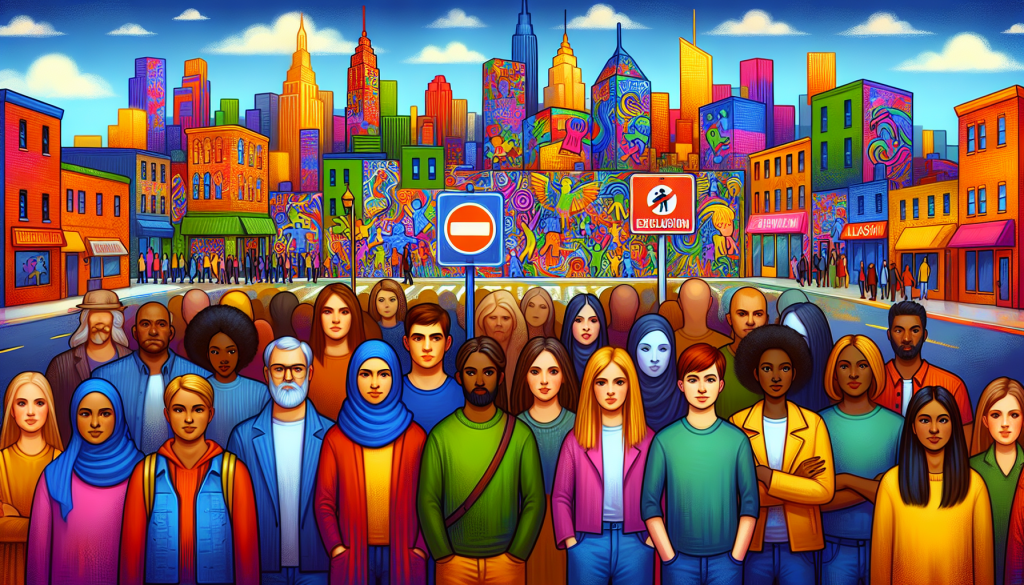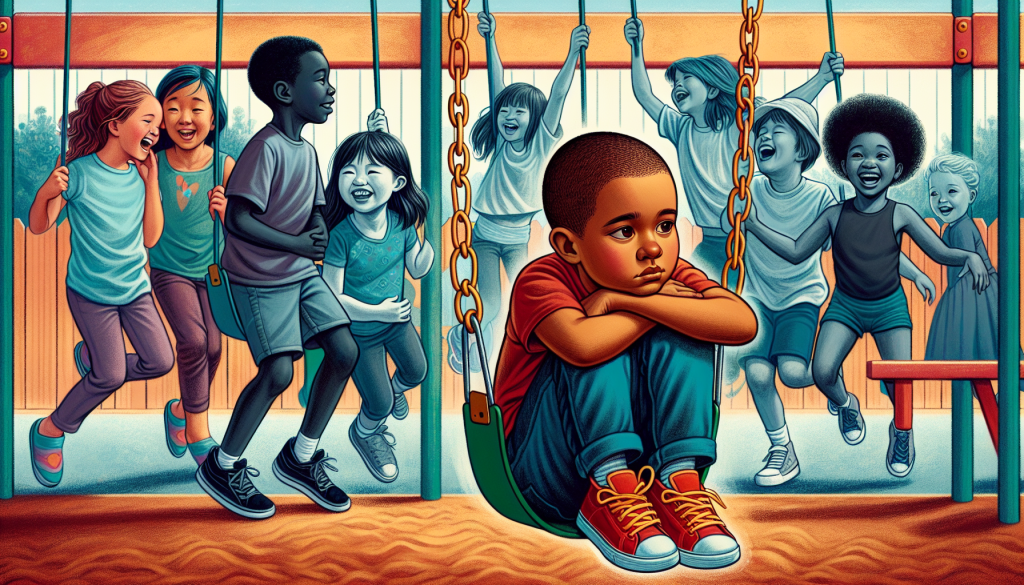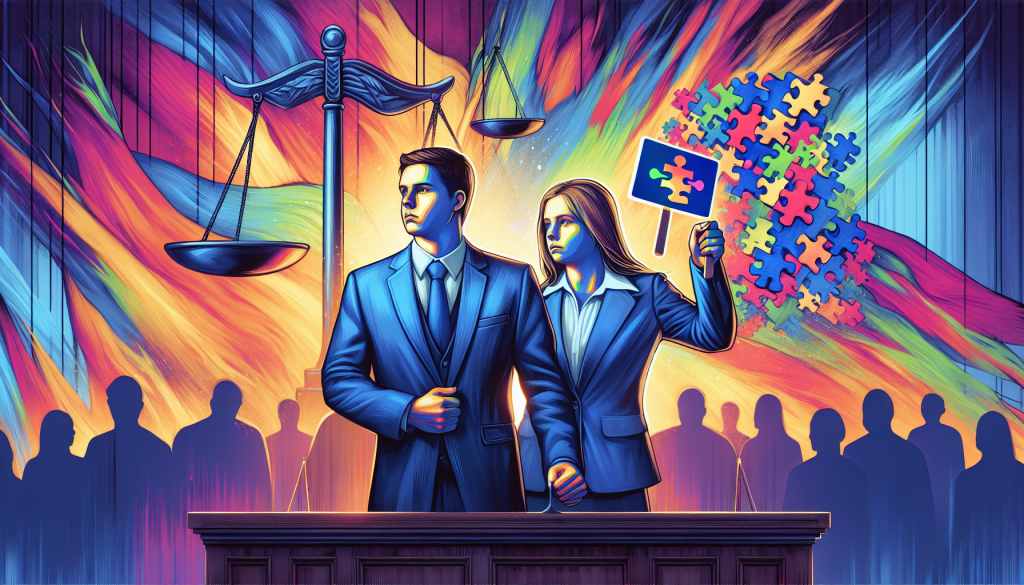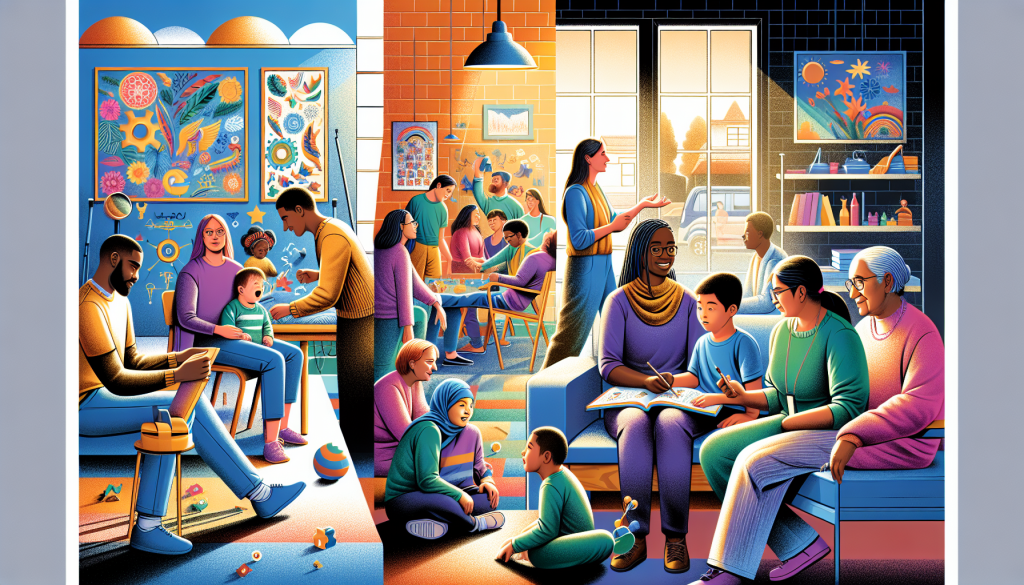Autistic individuals face significant discrimination, particularly in relation to autism and discrimination, that affects their mental health, social interactions, and opportunities in education and employment. This article explores these challenges and offers actionable steps to promote inclusion and understanding.
Key Takeaways
- Stigma surrounding autism leads to social isolation and negatively impacts the mental health of autistic individuals, making them feel misunderstood and less able to form meaningful connections.
- Inclusive environments and community understanding are crucial for countering discrimination and stigma against autistic people, facilitating better social integration and well-being.
- Public education, awareness campaigns, and positive media representation are essential strategies for challenging stereotypes, promoting acceptance, and fostering an inclusive society for autistic individuals.
Autism and Discrimination: Tackling Stigma and Promoting Inclusion

Society often views autism through a lens of misunderstanding, which leads to discrimination that adversely affects the mental health and social well-being of autistic individuals. Many autistic individuals report feeling misunderstood, which can obstruct their ability to forge meaningful friendships. Social situations with high sensory input can overwhelm autistic individuals, prompting them to withdraw, thus increasing feelings of isolation.
Caregivers of autistic individuals may also experience what is known as affiliate stigma, feeling judged because of their association with autism. This stigma can extend beyond the individual, affecting their families and support networks. Coping strategies like selective disclosure and self-advocacy may help autistic individuals manage stigma, but their effectiveness can vary.
Creating inclusive spaces benefits not only autistic individuals but also promotes community understanding and support. Fostering environments that cater to the needs of autistic people helps dismantle barriers that contribute to their marginalization. This perspective encourages a deeper exploration of discrimination’s facets and steps to promote inclusion.
Introduction
Autistic individuals face a significant level of stigma, stemming from societal ignorance and negative stereotypes associated with autism. This stigma can manifest not only in overt discrimination but also in subtle forms of prejudice, affecting how autistic people are interacted with in everyday life. The stigma experienced by autistic people contributes to feelings of loneliness and isolation, as societal perceptions often label them as socially unfit or undesirable.
A comprehensive look at how discrimination occurs reveals its impacts on various aspects of life. Stigma profoundly affects mental and physical health, social interactions, education, and employment.
This blog explores these themes, providing insights into the challenges faced by autistic individuals and highlighting the importance of promoting inclusion and acceptance.
Understanding Discrimination Against Autistic Individuals
Fundamental misunderstandings of autism often lead to discrimination against autistic individuals. Viewing autism through a narrow lens fosters negative stereotypes and prejudices. Such misunderstandings severely impact the mental health and social well-being of autistic individuals. Many feel misunderstood, obstructing their ability to forge meaningful friendships.
Social situations with high sensory input can overwhelm autistic individuals, prompting them to withdraw and increasing feelings of isolation. Inclusive spaces not only benefit autistic individuals but also promote community understanding and support.
Caregivers of autistic individuals may also face affiliate stigma, feeling judged because of their association with autism. Coping strategies like selective disclosure and self-advocacy may help autistic individuals manage stigma, but their effectiveness can vary.
Addressing these dynamics is crucial for tackling discrimination and fostering a more inclusive society.
The Impact of Autism Stigma on Mental and Physical Health

Negative societal attitudes towards autism significantly affect the mental well-being of autistic individuals. Stigma associated with autism leads to issues like low self-esteem and social exclusion. Experiencing stigma heightens the risk of depression among autistic individuals, with only a small percentage feeling accepted in society.
Camouflaging autistic traits can be mentally exhausting for those trying to avoid stigma. Autistic individuals often face increased levels of loneliness, which is linked to higher instances of depression and anxiety. Individuals with autism spectrum disorder (ASD) are significantly more likely to experience healthcare denial and mistreatment compared to the general population. Negative societal attitudes often discourage autistic individuals from seeking necessary healthcare, impacting both their mental and physical health.
Designing environments that cater to the sensory and social needs of autistic individuals greatly enhances their quality of life and inclusion. Addressing these impacts is essential for developing interventions that meet both mental and physical health needs.
Social Isolation and its Consequences for Autistic People

The experience of stigma can cause autistic individuals to feel isolated and can hinder their ability to form friendships and access educational and employment opportunities. Social exclusion is a common manifestation of discrimination against autistic individuals, impacting their ability to form connections. Loneliness and social isolation, exacerbated by stigma, commonly contribute to feelings of depression and anxiety among autistic people.
Autistic individuals are significantly more likely to experience feelings of loneliness compared to their non-autistic peers. Challenges in social skills make it hard for autistic people to establish connections, heightening their sense of isolation. Sensory processing differences may lead autistic individuals to prefer solitude, often misinterpreted as social isolation.
Stigma surrounding autism affects not only autistic individuals but also their families, who may experience shame and social isolation. Addressing social isolation requires fostering inclusive environments and promoting understanding within communities.
Discrimination in Education and Employment
Autistic individuals often encounter high rates of unemployment or underemployment due to employer biases regarding their social and communication skills. Workplace discrimination against autistic individuals severely impacts their self-esteem and overall quality of life. Employers must make reasonable workplace adjustments to support autistic employees, including modifications to the work environment to help them perform effectively.
Many autistic individuals struggle to transition from school to competitive employment, with only a small percentage securing jobs after leaving educational institutions. Discrimination in education can manifest as bullying, stereotyping, and exclusion, hindering academic achievement and social development.
Addressing these challenges is crucial for developing strategies to support autistic individuals in educational and employment settings.
The Role of Healthcare Providers in Addressing Discrimination
Healthcare professionals need additional training to effectively treat patients with ASD and understand their specific healthcare requirements. New regulations for Sections 1557 and 504 strengthen protections against discrimination in healthcare for individuals with disabilities. These regulations support LGBTQ+ autistic individuals by removing barriers to appropriate care.
The new rules aim to improve access to quality health services and autism services for autistic individuals. Clinics tailored for individuals with disabilities can improve the quality of care for ASD patients by addressing their unique needs. However, fear that disclosing their diagnosis to healthcare providers will affect their care is a common concern among autistic individuals.
LGBTQ+ autistic individuals face higher rates of service refusal and insurance not being accepted, creating significant barriers to adequate healthcare for autistic populations. Family members of autistic individuals face stigma, leading to increased anxiety, depression, and poorer physical health outcomes. Improving training and awareness among healthcare providers is essential to addressing these issues.
Legal Protections and Civil Rights for Autistic Individuals

The Americans with Disabilities Act (ADA) prohibits discrimination against individuals with disabilities, ensuring equal access to services including employment and public facilities. The Rehabilitation Act protects individuals with disabilities from discrimination in federally funded programs, including state-run educational institutions. The Fair Housing Act prevents discrimination in housing based on disability, requiring accommodations for individuals with disabilities.
The Individuals with Disabilities Education Act (IDEA) mandates that public schools provide necessary services and accommodations for students with disabilities. The Architectural Barriers Act ensures that new or renovated government buildings meet accessibility standards for individuals with disabilities. The ADA classifies autism as a disability, ensuring equal employment opportunities and protections for autistic individuals.
Many autistic individuals are unaware of their workplace discrimination rights, leading to underreporting of incidents. Educating autistic individuals about their legal protections empowers them to advocate for their rights.
Promoting Neurodiversity and Reducing Self-Stigma
The neurodiversity movement emphasizes recognizing autism as a natural variation of human diversity rather than a disorder. Internalized stigma among autistic individuals diminishes self-worth and increases feelings of isolation. Selective disclosure can help autistic individuals share their identity with trusted individuals, fostering supportive relationships.
Inclusive environments and public awareness about autism help combat stigma and enhance acceptance. Embracing neurodiversity by recognizing and celebrating the unique strengths and perspectives of autistic individuals leads to a more inclusive and supportive society.
Effective Interventions to Combat Autism Discrimination

Public awareness and education about autism are priorities for reducing stigma and promoting inclusivity. Effective strategies to counter autism discrimination significantly enhance the social integration of autistic individuals. Developing effective interventions to target the stigma faced by autistic individuals and their caregivers is crucial.
Creating ‘autism-friendly’ spaces aims to reduce stigma and promote acceptance. Research on autism stigma can lead to creating autism-friendly environments that foster acceptance and understanding.
Future research should identify strategies that effectively reduce stigma and enhance the well-being of autistic individuals.
Public Education and Awareness Campaigns
Awareness campaigns are crucial for dispelling myths and increasing understanding of autism among the general population. Public awareness campaigns educate society about autism, helping to dispel myths and foster acceptance. These campaigns use various formats, such as social media, community events, and workshops, to reach a broader audience.
Well-designed public campaigns can dispel myths about autism and enhance understanding of autistic individuals’ experiences. Public education and inclusive media representation are essential in reducing stigma and promoting acceptance of autistic individuals.
Inclusive Media Representation
Positive portrayals of autistic individuals in media can shift public perceptions and challenge harmful stereotypes. Accurate media portrayals of autistic characters promote empathy and cultural acceptance, challenging existing stereotypes. Positive portrayals of autistic individuals in media influence societal views and contribute to reducing stigma.
Inclusive media representation is a powerful tool for changing public attitudes and fostering a more inclusive society. Showcasing the diverse experiences and strengths of autistic individuals, media plays a crucial role in combating stigma.
Creating Autism-Friendly Spaces
Creating autism-friendly spaces improves comfort and inclusion for autistic individuals. Designing environments that accommodate sensory needs greatly enhances the comfort and participation of autistic individuals. Architects can create autism-friendly spaces by minimizing sensory overload and providing clear pathways, helping to reduce anxiety for autistic individuals.
Creating autism-friendly environments is a practical step toward fostering acceptance and inclusion. Addressing sensory sensitivities and promoting accessibility creates spaces welcoming for all to support autistic people.
The Importance of Further Research
Rigorous studies gather insights that inform evidence-based interventions to support autistic individuals. Research indicates many existing coping strategies employed by autistic individuals to deal with stigma are limited in effectiveness.
Further research should develop and refine strategies that effectively reduce stigma and enhance the well-being of autistic individuals. Investing in autism research helps create a more inclusive and supportive society.
Summary
Summarizing key points, this section will wrap up the discussion, leaving readers with a strong call to action and hope for the future. It will emphasize the importance of continued efforts to combat stigma and promote inclusion for autistic individuals.
Frequently Asked Questions
What is the main cause of stigma against autistic individuals?
The main cause of stigma against autistic individuals is societal ignorance and negative stereotypes, which foster misunderstandings and prejudice. Addressing these misconceptions is crucial for promoting acceptance and understanding.
How does stigma affect the mental health of autistic people?
Stigma negatively impacts the mental health of autistic individuals by causing low self-esteem, social exclusion, and an increased risk of depression. Addressing these societal perceptions is crucial for improving their overall well-being.
What role do healthcare providers play in addressing autism discrimination?
Healthcare providers have a vital role in addressing autism discrimination by obtaining specialized training to meet the needs of autistic individuals and ensuring compliance with regulations that protect against discriminatory practices.
What legal protections are available for autistic individuals?
Autistic individuals are afforded legal protections under laws such as the Americans with Disabilities Act (ADA), the Rehabilitation Act, and the Individuals with Disabilities Education Act (IDEA), which promote their access to services, education, and employment. These laws aim to ensure equality and prevent discrimination.
How can public education and awareness campaigns help reduce stigma?
Public education and awareness campaigns are effective in reducing stigma by dispelling myths and fostering acceptance through increased understanding of autistic individuals’ experiences. This approach ultimately promotes a more inclusive society.
